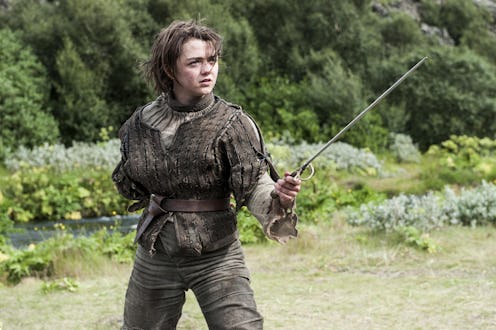Entertainment
Why Wouldn't China Want You To See 'GoT'?

Game of Thrones has a reputation for bloody, violent massacres and ample nudity, so it shouldn't have been too surprising that when China's CCTV aired Game of Thrones on their network that it was met with disappointment. Viewers saw the show reduced to 'a medieval castle documentary." But amidst China's heavy handed censorship and editing, which chucked away close to twenty minutes of the series, Ishaan Thardor of the Washington Post likened Game of Throne's themes to China's history, making the conversation about Game of Thrones and China a viable mode of discussion.
While there is room for argument and debate, as the show and its parent books are primarily based on historical events in European history (the Red Wedding, for instance, was based on a real-life massacre), and commenters have been quick to say that Thardoor might have "pulled a muscle stretching" to reach these conclusions, there is also room to wonder if the Chinese government fears uprisings like in Game of Thrones if its audience members are exposed to such ideas. That's the base foundation of censorship, isn't it? Block people from what you don't want them to know, so you can stay in power? That's a rudimentary explanation, but it's a fair one.
So Thardoor has sought to find a deeper potential as to why rulers might be so fearful of this show in particular, so in his argument, he likens The Wall to The Great Wall, and in perhaps the most valid comparison, he likens Targaryens to people who fled to Taiwan:
The most storied noble house in "Game of Thrones" is that of the Targayens, the silver-haired, dragon-riding family that begins the show in exile across the sea. We learn that the Targaryens once ruled all of Westeros until a rebellion, punctuated by a few hideous slaughters, chased them to a small, craggy isle off the coast called Dragonstone. Not long after the last of the Targaryens flee the island for more distant hideaways, the rock becomes the fortress of Stannis Baratheon, another lord who thinks himself the true ruler of Westeros. Dragonstone exists in the series as a permanent reminder of dissent, brooding sullenly off the shores of the realm.
Essentially, he says that China's rulers have some incentive to fear the power of Game of Thrones on account of parallels like these. Yes, it's interest tying historical stories together because it's certainly vexing why in the first place China would go to such lengths to not simply do away with Game of Thrones, but to hack it to bits. Viewers aren't foolish and can sense sloppy censorship. Audience members took to the web, saying:
So they’ve cut about a quarter of all the fight scenes, then a quarter of the nude scenes [...] I guess that’s okay if all you want to watch is a medieval European castle documentary.
And also:
I estimate that they cut about twenty minutes,” one disgruntled Weibo commentator wrote after the first episode re-aired on Sunday. “The story feels discontinuous… [When they began re-airing it], my first reaction was ‘This can’t be!’ Then my second reaction was, ‘My God, what a mess.’
So to confirm, yes — the show was hacked to death like a Stark at a Red Wedding. What The Post's analysis seems to do is perhaps justify why China would want to erase so much from a controversial but excellent show.
But this may not have anything to do with Game of Thrones at all — China ordered multiple shows to be banned from online screening. The CCTV, however, seems oddly selective with what they choose to do away with, and what they choose to edit: The Big Bang Theory was too hot for viewers, apparently, as the innocuous sitcom is gone, but the drama House of Cards remains online.
It's a precarious methodology of organizing censorship, indicating that CCTV may not know exactly what — or why — they want to censor things, and all of us are just searching for plausible reasons to eliminate good television shows, like Game of Thrones, from its viewers. On the other side of the globe, w're just searching to understand the motive behind such odd and sloppy censorship. So needless to say, China will never see that rape scene. But I'm assuming that the scene in which Cersei and Jaime are found by Bran was cut out, too, so it wouldn't even make sense to viewers, anyway. And for the first time, it makes me think — at least we have a reason to discuss why that rape scene doesn't make sense to us.
Image: HBO